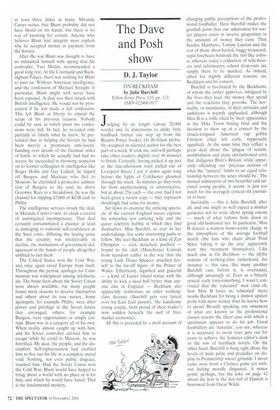The Dave and Posh show
D. J. Taylor
ON BECKHAM by Julie Burchill Yellow Jersey Press, £10, pp. 121, ISBN 0224061917 Judging by its length (about 20,000 words) and its dimensions (a dinky little hardback format one step up from the Beatrix Potter books), On Beckham probably occupied its talented author for the best part of a week. It took me. and will perhaps take other readers, slightly over 40 minutes to finish. Certainly, having picked it up just as the late-afternoon train pulled out of Liverpool Street I put it down again long before the lights of Colchester gleamed through the murk. As minutes go they were far from unentertaining or uninstructive, but at about 25p each — the cost, had I not been given a review copy — they represent shockingly had value for money.
Set down to examine the enticing spectacle of the current England soccer captain, his somewhat less enticing wife and the queer celebrity bubble in which they find themselves. Miss Burchill, as ever in her undertakings, has some interesting paths to follow. She sees Beckham as a kind of Zen Olympian — cool, detached, purified — bound to his club (Manchester United) from teendom rather in the way that the young Lady Diana Spencer attached herself to the far-off figure of the Prince of Wales. Effortlessly dignified and graceful — a kind of Easter Island statue with the ability to kick a dead ball better than anyone else in England — Beckham also apparently symbolises an older workingclass decency (Burchill gets very lyrical over his East End parents, 'the handsome young couple, both proud of their trades') now sodden beneath the surf of freemarket economics.
All this is preceded by a droll account of changing public perceptions of the professional footballer. Here Burchill makes the goodish point that our admiration for soccer players exists in inverse proportion to the amounts of money they earn. Thus Stanley Matthews, Tommy Lawton and the rest of those short-haired, baggy-trousered, sepia forebears bestrode the turf like colossi, whereas today's collection of wife-beaters and reformatory school drop-outs are simply there to be mocked. As indeed, albeit for slightly different reasons, are Beckham and his consort.
Burchill is fascinated by the Beckhams, of whom she rather approves, intrigued by the lives they lead, the money they spend and the reactions they provoke. The normality, or mundanity. of their attitudes and ambitions is warmly applauded. although Miss B is a trifle irked by their appearance at the Mike Tyson boxing bout and the decision to show up at a concert by the cloaca-tongued American rap goblin Eminem (they left early, supposedly appalled). At the same time they reflect a great deal about the 'plague of sexism, snobbishness and plain old-fashioned envy that disfigures Blair's Britain' while apparently offending our 'precious notions of what the "natural" limits to an equal relationship between the sexes should be'. The mutual admiration of two beautiful and talented young people, it seems, is just too much for the averagely cynical old journalist to bear.
Inevitably — this is Julie Burchill, after all, and one might as well expect a market gardener not to write about spring onions — much of what follows boils down to good old-fashioned sex. In particular, Miss B detects a wanton homo-erotic charge in the atmosphere of the average football match (the fans who chant about Posh Spice 'taking it up the arse' apparently want this treatment themselves). Like much else in On Beckham — the idyllic notions of working-class fatherhood, for instance — this case, like many another Burchill case before it, is overstated, although amusingly so. Even as a bitterly cynical early fortysomething, I wasn't convinced that the 'educated' man (and oh, how Miss B hates us 'educated' men) mocks Beckham for being a dimwit upstart prole with more money than he knows how to spend. Broadly speaking, any ornament of what are known as the professional classes resents the sheer ease with which a sportsman appears to do his job. Good footballers are 'naturals', you see, whereas it is necessary to sweat your guts out for years to achieve the features editor's desk or the row of hardback novels. On the other hand, Burchill is bang right about the levels of male pride and prejudice on display in Premiership soccer grounds: I never came away from a Chelsea game yet without feeling morally disgusted. A minor point, perhaps, but the joke on page 42 about the lion in the den full of Daniels is borrowed from Oscar Wilde.














































































































 Previous page
Previous page